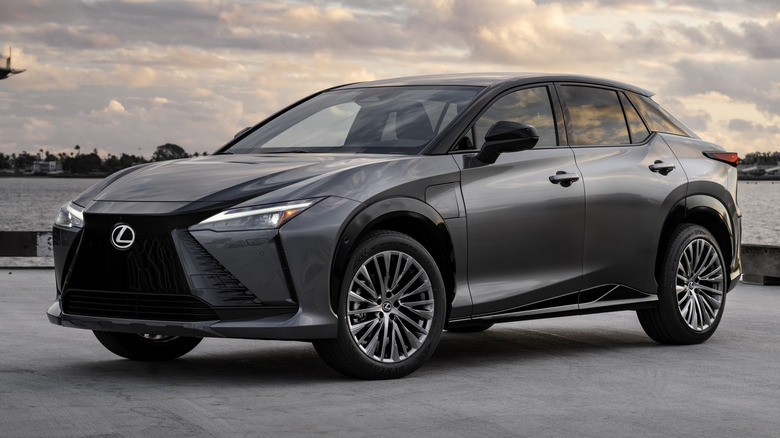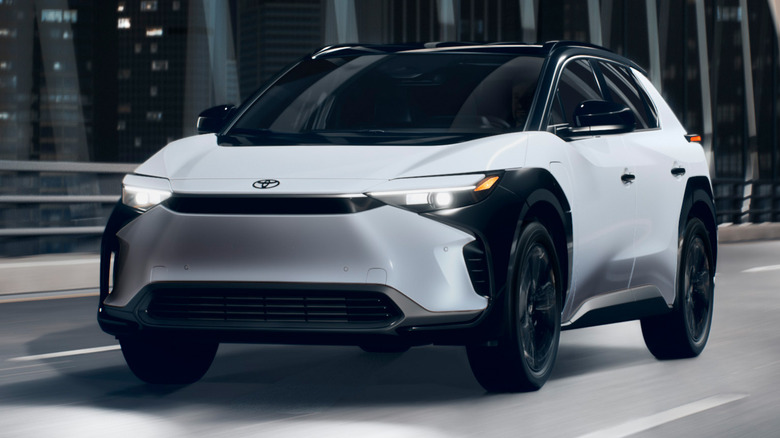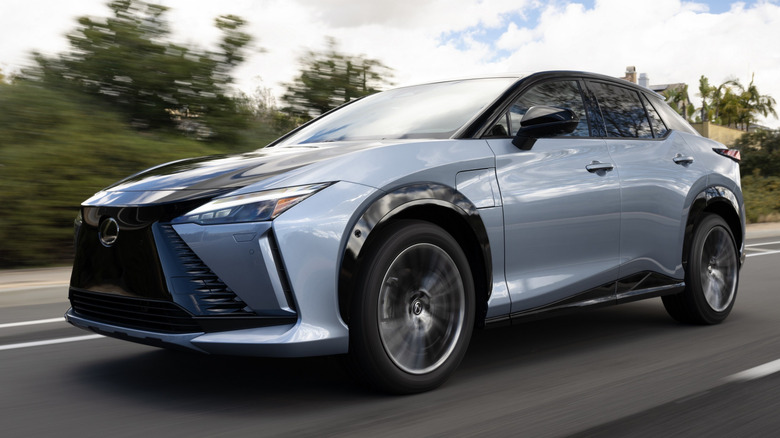Lexus RZ Vs. Toyota bZ4X: Is The Price Difference Worth It? Here's What Owners Say
So many car manufacturers have been pivoting to electric vehicles in recent years. It is understandable as to why. Not only are they just exciting, often well-made vehicles, but their overall impact on the environment is typically a whole lot less than their gas-powered counterparts. One company that has not dived as far into the EV pool as you might expect is Toyota. The company offers a plethora of hybrid and plug-in hybrid vehicles, but in terms of pure EVs, there are just two. If you are looking for an all-electric SUV, though, there is just one option: the Toyota bZ4X. This methodology is mirrored by Toyota's luxury brand as well, whose only EV option is the Lexus RZ SUV.
The reason there is a parallel with the two brands is that the Toyota bZ4X and Lexus RZ are extremely similar vehicles, both built on the exact same e-TNGA platform with the same 112.2-inch wheelbase (as is the Subaru Solterra). Comparing their most basic level trims — the bZ4X XLE and the RZ 300e — the two SUVs are also both front-wheel drive vehicles and utilize the same all-electric powertrain that allows for a maximum output of 201 horsepower. So, it begs the question: why is the starting price of a 2025 Lexus RZ $42,800 (plus a $1,165 delivery fee) when the 2025 Toyota bZ4X only starts at $37,070 (plus a $1,595 delivery fee)? Well, there are some differences between the two vehicles, particularly with what is inside them, that show why Lexus is the more expensive luxury brand compared to Toyota.
Differences in materials and technology
Whether or not you want to spend $5,000 more on a Lexus RZ than a Toyota bZ4X comes down to how important things like certain safety features or certain luxury conveniences are important to your daily driving experience. For example, there are the seats of the two SUVs. In the Toyota, these are made of fabric with trims of a faux leather called SofTex, but for the Lexus, these seats are a higher quality, Lexus-made faux leather called NuLuxe. If you want those seats to have heating capabilities, you will have to pay extra for the Toyota, whereas the most base-level Lexus comes standard with that feature. The same goes for a heated steering wheel.
Lexus also outdoes the Toyota when it comes to technology. This can be something as commonplace as a stereo system. The Toyota has a six-speaker system, while the Lexus has 10 peakers standard. The 14-inch infotainment screen for the Lexus is nearly two inches larger than the Toyota's. In terms of the safety features, though, the two are on quite similar footing. Both vehicles come standard with back-up cameras, pedestrian detection, lane departure alerts, and more. However, the Lexus does have one more airbag than the Toyota's eight. If you want to make the 2025 Toyota bZ4X as close to the Lexus RZ inside and out as you can, that path is available to you. However, you will need to pay for upgraded options and packages for the Toyota to be on equal footing. At that point, maybe just get the Lexus.
Are customers happier with the Lexus than the Toyota?
The Toyota bZ4X and Lexus RZ were both introduced for the 2023 model year, so we do not have data on either of these vehicle's long-term viability. However, what we can see is that in their short lives, neither all-electric SUV has had many complaints from drivers. Across the three model years of the Lexus RZ thus far, there have only been a total of 10 complaints made by drivers to the National Highway Traffic Safety Administration (NHTSA). In that count is the current 2025 model, which has zero driver complaints as of the writing of this article. On the user-submitted automobile issue site CarComplaints, the Lexus has zero complaints made against it in total.
Meanwhile, the Toyota bZ4X has a few more complaints made against it as well, but it's still deemed very reliable by customers. The three model years have only accrued 22 complaints against them by the NHTSA, and once again, the current model year has zero made against it. The 2023 model does have one submitted problem on CarComplaints, which is about a limit on how much DC fast charging you can do in a 24-hour period. The other model years have nothing. It should be noted though that the NHTSA has issued two recalls for the 2023 model and one for the 2024 model, whereas the Lexus has zero. All in all, these are nearly identical SUVs made by what are probably the two most reliable car brands in the world. There is little for most customers to dislike about either vehicle.


